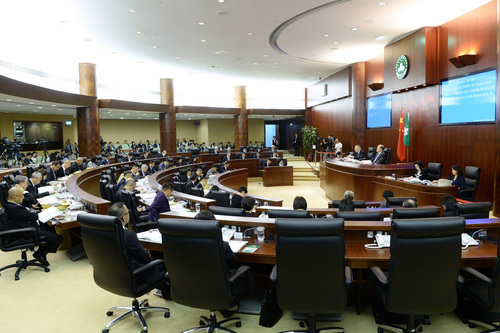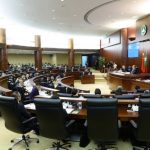 Chief Executive, Mr Chui Sai On, delivers the Policy Address for the Fiscal Year 2016 at the Legislative Assembly.
Chief Executive, Mr Chui Sai On, delivers the Policy Address for the Fiscal Year 2016 at the Legislative Assembly.
The Chief Executive, Mr Chui Sai On, said during the Policy Address for the Fiscal Year 2016 today that the Government is confident in Macao’s long-term development, given its stable financial condition and low unemployment rate. Other elements favouring Macao in achieving further success included its healthy fiscal surplus, its large-scale infrastructure projects being carried out progressively, and its low inflation rate, Mr Chui added. Delivering his Policy Address for the Fiscal Year 2016 at a plenary session of the Legislative Assembly this afternoon, Mr Chui reiterated the Government’s belief that “enhancing livelihoods while developing the economy” is the driving force for boosting regional cooperation, promoting adequate diversification of the economy and achieving the goals of the “Centre and Platform” policies. “Centre and Platform” refers to transforming Macao into a world centre for tourism and leisure and into a commercial and trade cooperation service platform between China and Portuguese-speaking Countries. Looking to the year ahead, Mr Chui said the Government would continue to adhere to its principle of keeping expenditure within the limits of revenue when drawing up its budget, as well as striving for fiscal balance. He added that the Government has a well-established mechanism for managing its fiscal reserve in order to cope with challenges arising during the consolidation period of the city’s gaming industry. The Chief Executive highlighted five ways to advance the city’s economy. They are: to promote healthy development of the gaming industry; to intensify the development of the “Centre” policy; to create a favourable environment for emerging industries and support local small- and medium-sized enterprises (SMEs); to protect employment rights of local residents; and to strengthen regional cooperation. The Government would conduct an analysis of the city’s gaming sector upon completing its mid-term review of the industry, Mr Chui said. Factors under review include: how agreements set out in the gaming concessions have been executed; gaming-related legislation; synergies between gaming and non-gaming elements; the development of the gaming promoter industry; and the influence the gaming sector has on the local economy, SMEs, the community and residents’ livelihoods. The Government would encourage gaming operators to engage more in large-scale tourism projects that would help diversify the sector by offering more leisure activities and non-gaming elements, Mr Chui stated. Regarding tourism, the Government would continue to upgrade the city’s infrastructure and accommodation, further promoting Macao’s special role as a destination for cultural heritage and leisure tourism. The direction of policy is to explore ways of diversifying international source markets for the city’s tourists, to promote further the Historic Centre of Macao, and to ensure Macao is marketed via multi-destination travel packages. Meanwhile, the Government would continue to evaluate the city’s capacity for receiving tourists, in an effort to achieve a balanced development model and ensure residents’ quality of life remains unaffected. “Cultivating emerging industries and supporting small- and medium-sized enterprises” is one of Mr Chui’s strategies to expedite adequate diversification of the economy mentioned in the Policy Address for the Fiscal Year 2016. He said the Government would devise a system of statistical benchmarks for a number of local industries. They are: the meetings, incentives, conferencing and exhibitions (MICE) industry; the cultural and creative industries; and Chinese medicine. In the coming year, the Government would launch measures to broaden the role of the Young Entrepreneurs Aid Scheme so that it covers the three major free trade zones in Guangdong Province. The Government would also introduce a young innovators business scheme with Internet-related business as the main theme. The Chief Executive said the Government had always attached great importance to protecting the employment rights of local residents and to improving their upward mobility or alternatively their horizontal mobility in their career or with their employer. The Government also encouraged local and large-scale enterprises to provide on-the-job training and salary increments, as a way to maintain the stability of their workforces, he said. Mr Chui stated the Government would continue to optimise the Labour Relations Law. Amendments include introducing a paid paternity leave and examination of issues arising from when a statutory holiday falls on an employee’s rest day. The Law on Employment of Non-Resident Workers would be reviewed next year. A proposal for a law regulating part-time workers would be also prepared, Mr Chui said. Regarding regional cooperation, the Government would step up efforts in: facilitating the establishment of the “Platform” and “Three Centres” policies; seizing the development opportunities arising from the country’s “Belt and Road” initiative; and strengthening cooperation and exchange with countries and regions connected to the Association of Southeast Asian Nations, Portuguese-speaking Countries and Latin Countries. The “Three Centres” is a strategy to help Macao become respectively: a business and trade service centre for the SMEs in Portuguese-speaking Countries; a distribution centre for Portuguese-speaking Countries’ goods; and a convention and exhibition centre for economic and trade cooperation between China, Macao and Portuguese-speaking Countries. Mr Chui said the Government would continue to: play its special role in the country’s 13th five-year plan; coordinate local socioeconomic development; and make good use of the development opportunities arising from the Mainland and Macao Closer Economic Partnership Arrangement (CEPA). It would also press ahead with liberalisation of bilateral trade and commerce according to the Framework Agreement on Cooperation between Guangdong and Macao. The Government would gradually invest a part of the fiscal reserve in major large-scale construction projects in Guangdong and Fujian, and other country-led projects, as a way to guarantee returns on, and the value of, the reserve, Mr Chui said. A full copy of the Policy Address for the Fiscal Year 2016 and leaflets on it are available for download on the Government Portal website of the Macao SAR (http://www.gov.mo); the website of the Chief Executive’s Office (http://www.gce.gov.mo); the website of the Legislative Assembly (http://www.al.gov.mo); and the website of the Government Information Bureau (http://www.gcs.gov.mo);


